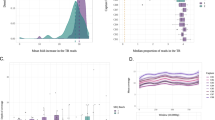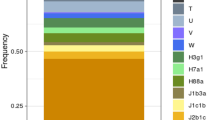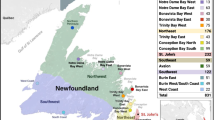Abstract
According to most historians, Christopher Columbus was born in Genoa, Italy. However, based on some key facts in the discoverer's biography, as well as in the linguistic analysis of his texts, some historians and linguists believe that Columbus could have been of Catalan origin. A Ligurian Columbus would have carried the Colombo surname, whereas he would have been called Colom if he were Catalan. In order to test whether it would be possible to discriminate between a Ligurian or a Catalan origin were Columbus' Y-chromosome haplotype to be retrieved, we genotyped 17 Y-chromosome STRs in 238 Spanish (from Catalonia, Valencia, and the Balearic Islands) and French Colom men, and 114 North Italian Colombo (from Liguria, Lombardy, and Piedmont). The Italian samples and, in particular, the Lombard Colombos were genetically as diverse as the general population, and we found little evidence of clusters of haplotypes that could indicate descent from a single founder. Colombo is actually the most frequent surname in Lombardy, where foundlings and orphans used to be given the surname Colombo. By contrast, Y-chromosome diversity was reduced in the Iberian Colom, where most of the men had Y chromosomes belonging to a few lineages. This implies that a positive identification would be more likely if Columbus were of Catalan descent. In this study, we have shown the diverse dynamics of two surnames linked by their etymology, in what is, to the best of our knowledge, the first genetic analysis of a surname in Southern Europe.
Similar content being viewed by others
Log in or create a free account to read this content
Gain free access to this article, as well as selected content from this journal and more on nature.com
or
References
De Yzaguirre L : Aproximació lexicomètrica a les interferències de base fonològica en els escrits autògrafs de Cristòfor Colom: La lengua materna de Cristóbal Colón. Eivissa: Consell interinsular d'Eivissa i Formentera, 2006.
Merrill CJ : Colom of Catalonia: Origins of Christopher Columbus Revealed. Spokane, WA: Demers Books, 2008.
King TE, Jobling MA : What's in a name? Y chromosomes, surnames and the genetic genealogy revolution. Trends Genet 2009; 25: 351–360.
King TE, Jobling MA : Founders, drift, and infidelity: the relationship between Y chromosome diversity and patrilineal surnames. Mol Biol Evol 2009; 26: 1093–1102.
McEvoy B, Bradley DG : Y-chromosomes and the extent of patrilineal ancestry in Irish surnames. Hum Genet 2006; 119: 212–219.
Sykes B, Irven C : Surnames and the Y chromosome. Am J Hum Genet 2000; 66: 1417–1419.
Miller SA, Dykes DD, Polesky HF : A simple salting out procedure for extracting DNA from human nucleated cells. Nuclear Acids Research 1988; 16: 1215.
Mulero JJ, Chang CW, Calandro LM et al: Development and validation of the AmpFlSTR Yfiler PCR amplification kit: a male specific, single amplification 17 Y-STR multiplex system. J Forensic Sci 2006; 51: 64–75.
Gusmao L, Butler JM, Carracedo A et al: DNA Commission of the International Society of Forensic Genetics (ISFG): an update of the recommendations on the use of Y-STRs in forensic analysis. Forensic Sci Int 2006; 157: 187–197.
Excoffier L, Laval G, Schneider S : Arlequin (version 3.0): an integrated software package for population genetics data analysis. Evol Bioinform Online 2005; 1: 47–50.
Athey TW : Haplogroup prediction from Y-STR values using a Bayesian allele frequency approach. J Genet Geneal 2006; 2: 34–39.
Adams SM, Bosch E, Balaresque PL et al: The genetic legacy of religious diversity and intolerance: paternal lineages of Christians, Jews, and Muslims in the Iberian Peninsula. Am J Hum Genet 2008; 83: 725–736.
Bandelt HJ, Forster P, Rohl A : Median-joining networks for inferring intraspecific phylogenies. Mol Biol Evol 1999; 16: 37–48.
Excoffier L, Lischer HEL : Arlequin suite ver 3.5: a new series of programs to perform population genetics analyses under Linux and Windows. Mol Ecol Resources 2010; 10: 564–567.
Morral N, Bertranpetit J, Estivill X et al: Tracing the origin of the major cystic fibrosis mutation (ΔF508) in European populations. Nat Genet 1994; 7: 169–175.
Saillard J, Forster P, Lynnerup N, Bandelt HJ, Nørby S : mtDNA variation among Greenland Eskimos: the edge of the Beringian expansion. Am J Hum Genet 2000; 67: 718–726.
Sturrock K, Rocha J : A multidimensional scaling stress evalutation table. Field Methods 2000; 12: 49–60.
Acknowledgements
We wish to express our gratitude to all donors, and to Professor Gabriella Girelli (University of Rome ‘La Sapienza’) and Ms Irene Contini (University of Rome ‘Tor Vergata’) for their cooperation in collecting the control north Italy samples. Funding for this research was provided by Malvarrosa Media – Valencia, Fundación M. Botín and University of Granada. Sampling of the Colom men was sponsored by ‘Fausto Producciones’.
Author information
Authors and Affiliations
Corresponding author
Ethics declarations
Competing interests
The authors declare no conflict of interest.
Additional information
Supplementary Information accompanies the paper on European Journal of Human Genetics website
Supplementary information
Rights and permissions
About this article
Cite this article
Martínez-González, L., Martínez-Espín, E., Álvarez, J. et al. Surname and Y chromosome in Southern Europe: a case study with Colom/Colombo. Eur J Hum Genet 20, 211–216 (2012). https://doi.org/10.1038/ejhg.2011.162
Received:
Revised:
Accepted:
Published:
Issue date:
DOI: https://doi.org/10.1038/ejhg.2011.162
Keywords
This article is cited by
-
The Y chromosome as the most popular marker in genetic genealogy benefits interdisciplinary research
Human Genetics (2017)
-
The relationship between surname frequency and Y chromosome variation in Spain
European Journal of Human Genetics (2016)
-
Y-chromosome diversity in Catalan surname samples: insights into surname origin and frequency
European Journal of Human Genetics (2015)



